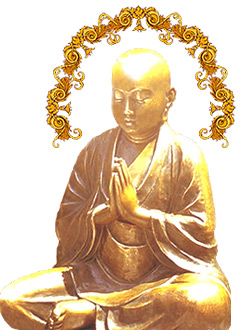|
From The Editor Archives:
9 /11/02
The Anniversary of 9-11:
A Buddhist Approach
We're coming up to the anniversary of 9-11 —
the destruction of the World Trade Center and the other terrorist
attacks. Approaching this from Buddhist and Taoist perspectives
is
very important, I believe, and instructive to people in general.
It's all too easy for one to get caught up in hatred and thoughts
of revenge and returning hatred with hatred.
If one would walk a Buddhist path to Ground Zero it would be with
mindfulness and compassion. There would be mindfulness that all
things rise and fall, joys and sorrow alike; there would be gratitude
for the lives of those who died and the joys they brought to others.
And there would be compassion, for those who died and the widening
circles of family, friends, acquaintances, other New Yorkers,
and other citizens of this country, and of the world, who were
affected by their deaths. And how could one not have compassion
for the terrorists themselves who suffered at their own hands
— who blinded themselves to all but their deeds and its preparations,
who moved freely in host countries — open societies —
among people who trusted them, leaving destruction and deceit
in their wake? As the terrorists literally consumed themselves
with their own hatred, they created new waves of suffering in
their wake.
It's too easy to return hatred with hatred, particularly as
war preparation seems to be growing here for an American attack
on Iraq. We should consider and learn from the Tibetans, so brutally
killed, as their country was ravaged by mainland China. There
was no Tibetan Liberation Army. With Buddhism permeating native
religions, the Tibetan people and the clergy did not return hatred
for hatred, blow for blow. They understood that they would be
creating spirals of suffering for other living beings, even for
those beings who were their killers and destroyers of their country's
very life. Instead, the Dalai Lama and many other Tibetans left
their country to spread the Buddhist dharma to the West, in a
peaceful manner.
The US is a world power, and clearly has a different place in
world history than Tibet. But if Buddhist truths are universal,
they apply to all people of all nations. These truths are that
we should understand karma — how actions begets action. Therefore,
we should always try to act wisely and with compassion toward
all humans and other sentient beings, with the interests of the
many in our hearts and minds, and not the interests of the few.
The rise of Islamic extremism and of Al-Qaeda could certainly
be examined in this context. And so too should the nationalism
and imperalist policies of the world powers likewise be examined.
To kill another living being dispassionately and not filled with
hatred, is in some way preferable to killing when one is filled
with rage. This may be the way of a Taoist or Zen warrior or even
of a hired killer. But such a path, I believe, does not lead one
up the mountain of discriminating wisdom and compassion toward
all living beings, nor does it necessarily lead to the destruction
of bad karma. History goes on its way, with its spirals and seeming
detours, and evil is often engaged and defeated at great cost
for the sake of a greater good — one thinks of Lincoln, the
abolition of slavery and the killing of millions in the Civil
War, and also of the war by the Allies against Nazi Germany and
the Axis powers. The American-led invasion of Afghanistan after
9-11 to search for bin-Laden, destroy Al-Qaida bases, and remove
the Taliban from state power could also be viewed in this context
of a just war.
I don't believe that Buddhism is necessarily pacifistic. But
there are degrees of attachment and non-attachment, even to life,
and degrees of strength in one's resolve to not add to injurious
karma. For nations to pursue wars — whether aggressive or
defensive wars, or just or unjust — involves tremendous suffering
for all concerned. Instead of war, or guerrilla war, the Tibetan
people as a collective chose the path of peaceful, non-violent
protest. To choose peace and not war, to turn the other cheek,
and be willing to die rather than fight and inflict pain and new
cycles of violence for the sake of peace, are certainly not actions
that most people could do. But we could try to capture something
of the Buddhist spirit of non-violence of the Tibetan people in
our own lives — being aware of hatred as it arises in the
mind, watching these thoughts and feelings rise and fall, as do
all of our thoughts and feelings; being non-attached to things
and events as we could have them be; being attached to selflessness,
to doing good, to not perpetuating destructive karma, and to acting
compassionately and with reverence toward all living beings.
May we approach the anniversary of 9-11 with these things in
mind. I also offer our Golden Lantern readers a poem I wrote a
month or so after the event itself, as the first submission to
our 9-11 Memorial Page. Dave and I would
value your feedback and
thoughts on 9-11, in letters to the Editor, and in prose commentaries
or in poems, approaching this tragedy from a Buddhist and/or Taoist
perspective, as I have tried to do.
May all beings be happy, peaceful, and free from suffering.
— Paul Dolinsky
|





